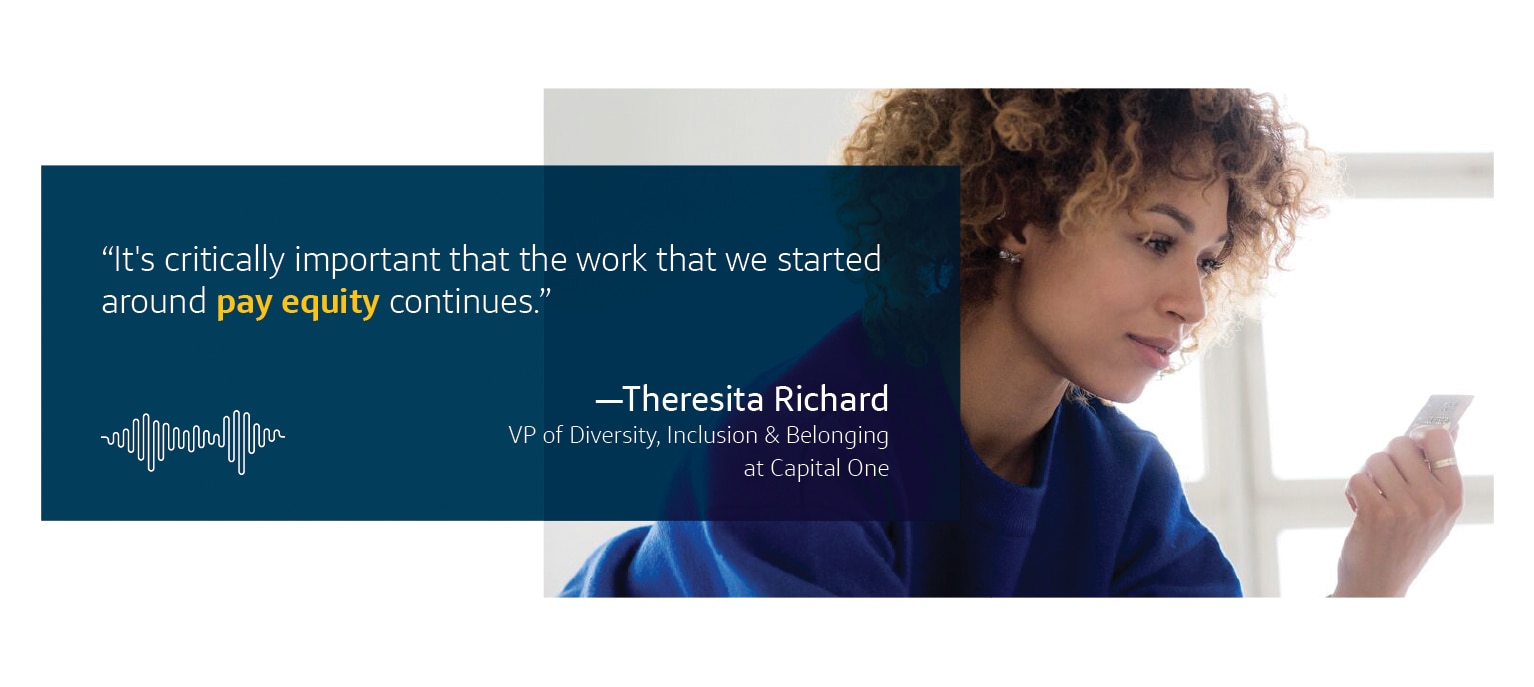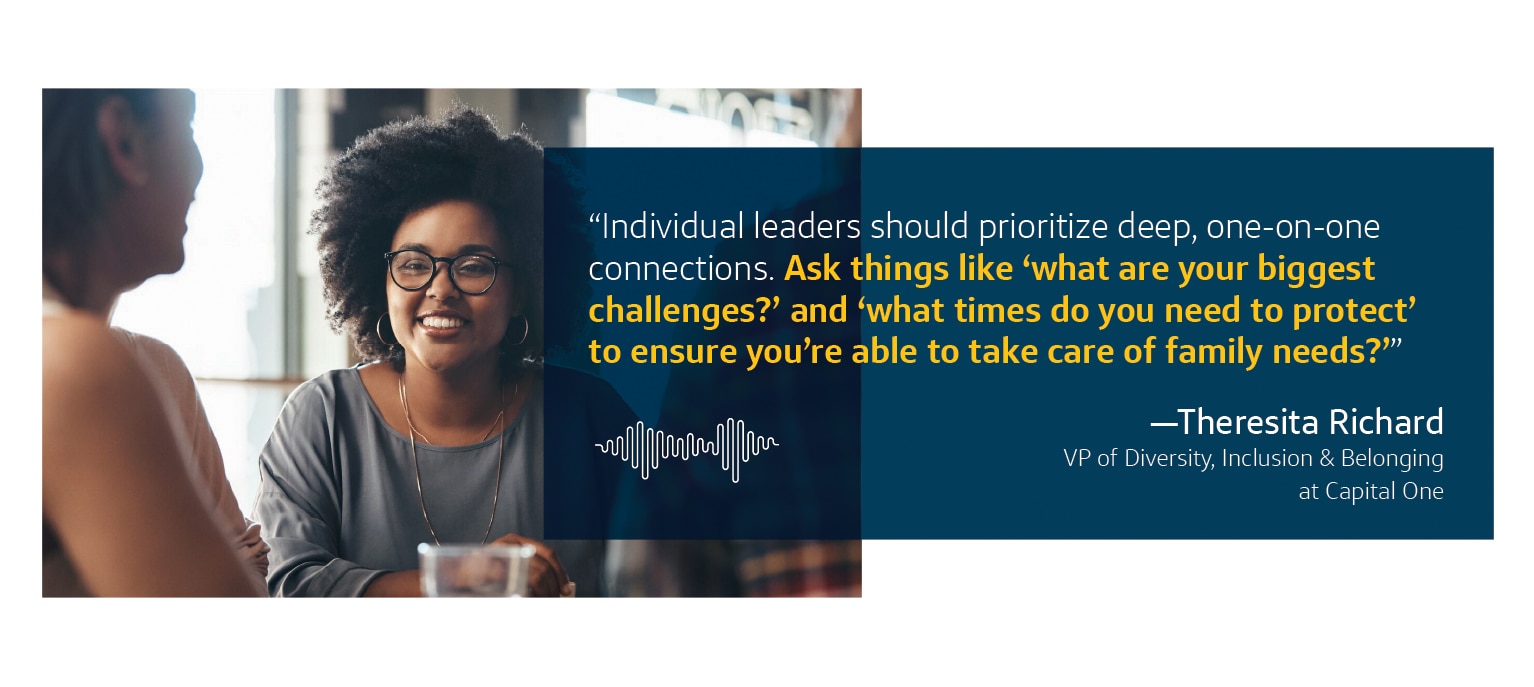Women at Work: Lessons from the Pandemic
Explore the dramatic impact COVID-19 has had on women in the workplace, particularly on women of color
Making the Connection is a new podcast series for Capital One Associates, where Meghan Welch, EVP, HR and Chief Diversity, Inclusion & Belonging Officer, sits down with leaders to talk about today’s most compelling people topics.
In the inaugural episode, which launched during Women’s History Month, Welch speaks with guest Theresita Richard, VP of Diversity, Inclusion & Belonging at Capital One, about the impact of COVID-19 on working women.
The conversation — raw, real, and honest — explores essential questions on why the pandemic impacted women’s careers dramatically more than men’s and what the long tail impact will be for women in the workplace, particularly when it comes to pay equity. The dialogue reveals three lessons on how we can support women meaningfully — now and in the future.

The impact of COVID-19 on women’s careers reflects inequities in the broader culture
Recent studies have shown that women's jobs are 1.8 times more vulnerable to the COVID-19 crisis than men's jobs. Globally, women make up 39% of employment but account for 54% of overall job losses.
As Welch says, these results aren’t solely due to the pandemic. “In many ways, the pandemic has intensified challenges that women already faced in the workplace.” For example, Richard shares, “The idea of working mothers having always worked the double shift is further amplified in the midst of a pandemic because we are always on, as generally being the primary caregiver.”

“We're seeing women feeling like they're stalling in their careers, or they are in jeopardy of losing financial security,” continues Richard. “We're also seeing that our support systems that were normally in place around childcare, school, the things that really allowed women to be successful in the workplace, those supports have been pulled.”
We also know that disruption to employment caused by COVID-19 has exacerbated long-standing workplace challenges faced by many women of color. Looking at the unemployment numbers at the end of 2020, Richard points out that, “women account for 100% of jobs lost in December, with the highest rates of unemployment among Black, Latina, and other demographic groups. The rate of unemployment for Black women was 8.4%. The rate for Latina women was 9.1%.”
“The industries that have been hit the hardest are retail, restaurant, and hospitality,” adds Richard. “When you look at the demographic breakdown of people in those industries, primarily you see, one, a large concentration of women, and, two, a large concentration of Black and Latinx women.”
When women leave the workforce, it creates a ripple effect of setbacks
As a result of COVID-19 dynamics, one in four women are faced with the harsh realities of contemplating downshifting their careers or leaving the workforce completely, and this will have far reaching effects beyond the pandemic itself.
“We know that these impacts will not be short-lived,” Welch says. Fewer women in the workplace means greater pressure for those at mid- to senior-levels, and fewer female role models for those starting out.
“It's often referred to as the broken rung, where women are having a harder time making that leap—that first leap to manager—that can propel you in your career,” Richard says.
With women losing their jobs, cutting back hours or leaving the workforce, Richard emphasizes the magnitude of setback when it comes to representation, “there was one statistic I read that floored me that said that the COVID-19 crisis could set women back to where we were in 2017.”
Pay equity is a solid step toward a meaningful response, but it doesn’t stop there
Welch asks the big question: “What can organizations like Capital One do to be part of the solution?”
The women agree that pay equity, the idea of paying employees the same pay when they perform the same or similar job duties, is an important aspect. “What I think about is what financial impact that [leaving the workforce in large numbers] can have on women in the long run,” Richard says. “It's critically important that the work that we started around pay equity continues.”

Regarding Capital One’s journey with pay equity, Welch adds, “For the vast majority of the jobs we hire for externally, we no longer ask someone what they made in their last job or what they're currently making as the basis to form the offer. Instead, we look at the salaries of people at the company who are actually doing that job, and use that information to form that offer.”
While many companies are beginning to adopt similar approaches to address equitable pay among similar roles, Welch and Richard agree that there is more companies can be doing to create equitable environments. They outlined three key ways companies can step up to address challenges, adjust the norms, and support working women at every stage in their professional journeys.

- Prioritize 1-on-1 connections: Individual leaders should prioritize deep, one-on-one connections. Richard suggests that leaders “be deliberate about checking in, asking questions, and listening to provide support, going beyond the typical ‘how are you?’ and asking things like ‘what's the biggest challenge that you're facing?’ and ‘what times do you need to protect” to ensure you’re able to take care of family needs?’
- Create flexible, supportive environments: Richard posits a reimagined future of work with a flexible, supportive environment, with benefits, including mental health offerings, to support a range of dynamics, situations and experiences. Welch adds, “We've done a lot of things like providing additional PTO and increasing our family care benefit, relaxing attendance guidelines as we know that flexibility during this time is just so important.”
-
Build on previous efforts: Richard encourages organizations to build on positive efforts that already have momentum. For Capital One, that means continuing to maintain pay equity across gender, race, and ethnicity as well as lean into our efforts to increase representation at more senior levels and our highest paying jobs.

As Welch and Richard wrapped, they recognized that the work to help solve challenges faced by women in the workplace continues. “We've been working so hard throughout COVID-19 to really understand what our associates are experiencing in order to put programs in place that really hit the biggest needs,” says Welch.
If you are a Capital One Associate, here’s how you can listen to the full episode:
-
Click on the podcast link in the story here.

